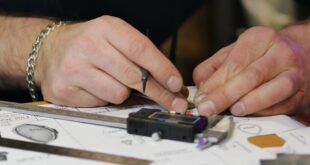Features
On 21 June, it’s a year since the first rail strike that signalled a new phase of working class resistance. Millions felt, “The working class is back.” Twelve months on, Socialist Worker spoke to those who have been at the sharp end of the confrontations about the high points and the shortcomings of the movement.
Sunday 11 June 2023
Issue 2859
Striking teachers march in London in February (Picture: Guy Smallman)
‘We could have had an indefinite strike, now we have a bad offer. We keep battling’
Gary, Parcelforce worker, Coventry
For me, it’s a year of contrasts. Our post strikes began in August, it was sunny on the fantastically lively picket lines and there was real momentum. We’d voted 98 percent for strikes on a 77 percent turnout. We were out after we had a 2 percent rise imposed on us as inflation went through the roof.
But the bitterness went deeper. We had worked all through the pandemic, risking our lives. Now we were insulted. On the picket line, you realise that working class people have such untapped knowledge. They discuss climate change or racism as well as anyone. They don’t have their views heard.
The union’s first big mistake came early when bosses sacked and victimised reps and activists. People were so angry about it. I think if we had walked out then we could have had an indefinite strike that would have led to victory. But we didn’t have the networks to do it unofficially when the union leaders told us to stay at work.
And then the union called off strikes for the queen’s death and for talks. That broke the momentum. We’ve been out for 18 days, but why didn’t we take all those days together? It would have humbled those arrogant Royal Mail managers.
Another big moment for me was when we had the demonstration in London. It was fantastic—one in six CWU members in Royal Mail was there. That could have been the basis for an indefinite strike. Instead, it wasn’t followed through.
Now we have a deal on the table, which the union supports, that is worse than when we started in some ways. We have to fight to overturn it but it won’t be easy to get the strikes back on—and they’d have to be at a higher level. There are new activists but there’s a real danger they are demoralised because the union let them down. It’s very important to argue that we are the union, not the people at the top.
‘Striking means you have control, and you have hope’
Elliot, RCN member, Sheffield
One of the strangest elements of working in healthcare is that you spend all your time around people yet feel notably isolated. When I first arrived at the nurses’ pickets on a frosty morning, I was expecting to see a few faces standing apart from each other. Instead I saw a vibrant picket with songs, chants, banners, and, most importantly, solidarity.
Solidarity can seem an abstract idea when you read about it. You think you understand its importance from theory. It’s only when you turn out with your colleagues and class that you truly get a glimpse at its power. For once in your working life, you feel that you have some control. That you have hope.
On a picket, there is little hiding. You’re in open revolt in front of colleagues, bosses, and the public. It can be intimidating, but when you stand up next to each other you feel you are learning to raise your fists. You are in the ring, no longer just taking the kicks but hitting back.
Maintaining that initial burst is tough. Without a victory it can be hard to keep on taking punch after punch from governments and parasitic bosses. This is only worsened when your own union seems to be desperately grasping back your collective fist just as it’s wound up tightest.
There has been a real sense in recent months that we, the rank-and-file, are having to pull the union back from self-imposed surrender again and again. Their panic cannot be our defeat. This is a tough battle. I wish I was telling of how it feels to win what we deserve, instead we’re still organising.
But we’re not alone. We’re alongside and learning from workers across the class who, as the struggle has drawn on, have become more militant and more political. One year on, we need to hit hard to win.
‘We have to end this era in victory’
Saira Weiner, Branch secretary Liverpool John Moores University UCU and regional chair of HE (personal capacity)
We should remember the positives as well as the tough times. The highlights were the pickets as our strikes began in October. They were lively, people with musical instruments and dancing. In universities, we have been fighting for years over pay and other issues. In the latest phase, we have all been out together, and that’s made a big difference.
At my place, there is now a core of 50 or so people who come to all the picket lines and union meetings. We have gone beyond the idea that a branch is the property of a branch secretary and chair. In higher education, you might know the people in your area, but not many others. The strike activity has overcome that.
The UCU Solidarity Movement has played a big role for support, to boost the fightback and have serious political discussions that are not policed by the union HQ. There’s still a long way to go. We have to win so much more than we have so far. Jo Grady and the union leaders paused the strikes and have repeated e-ballots trying to get a different answer from the members. There’s a sense of anger and being let down.
There have been days of united strikes such as on 1 February and 15 March. We met and visited nurses, postal workers and others. The strike rallies with teachers, the RCN, CWU, Unite and PCS unions were a real highlight. Speaking at a packed Adelphi hotel with hundreds of NEU members cheering— young and angry—was great.
It would have been even better if we had launched indefinite action, not just strikes with gaps between them. Now we need to fight to return to the picket lines as well as building the Marking and Assessment boycott and the strikes against punitive pay deductions. If this is a new era of resistance then we have to make sure it ends in victories.
‘People in poverty make me more certain to strike’
Jack, RMT member, NE England
Before the strike even began people I was working with declared themselves bankrupt. They were going to foodbanks—and now things are even tougher. Single parents are in thousands of pounds of debt, many living paycheck to paycheck. But it makes me more determined and shows the importance of the strike.
The strike is not all to do with pay, it’s also about safety and protecting jobs. If there are fewer staff, the railways will be less safe. When I joined the picket lines I was surprised at the amount of left wing ideas in discussions. People really flourished.
We were looking at the broader picture, like how do we fight austerity or raise money for food banks. There are still conversations about what strike days we want next, is the strategy working and how effective it is. I was up for a long fight, as were others with positions in the union. We know that this isn’t an easy battle.
Yes, I lose money from striking but I’d rather that than lose my job. I’m scared of losing my job, everyone is. Redundancies could affect anyone, no one is really safe, especially catering and customer-facing roles. But in my company we had a decent turnout and an overwhelming yes vote in the recent reballot.
We can’t take our foot off the gas—we are always fighting to win the next ballot. Driver-only operation would have meant lots of job losses. That’s been beaten, it’s not mandatory anymore. That’s a morale boost.
The RMT leaders may strive to end the dispute, it depends on what the government says. But I am prepared to be here in another 12 months’ time if I have to be. We will outlast the Tories—the working class is used to struggling. We have strength in numbers, the Tories are ripping themselves apart over it.
‘Other workers see us fighting and want to be part of it’
Debs Gwynn, NEU executive, NW England (personal capacity)
The first strike in February was exciting. I hadn’t done it for a long time and many others had never been on strike before. Many were apprehensive but when they were out people really enjoyed the solidarity. My school has had a picket line every strike day—except when we joined a London rally.
After the pickets we’d meet up for strike breakfasts to discuss what was going on, and what we thought about the campaign. This strike for me has been so much more than just withdrawing our labour. At the breakfasts people started to connect everything together so they were talking about capitalism, the economy and the Tories.
In my district the number of eligible members who could strike was 650 when we began, it is now around 750. This has been replicated across all areas—the north west has seen an increase of around 20,000 members. When people see the union fight, they want to be a part of it.
As much as some people may say workers don’t want to lose pay, we are actually seeing people join. Coordinating our strikes with other unions has definitely been important to see this strike as a part of wider attacks on public sector workers and working class people.
That feeling of not being alone galvanised people. The action taken so far has moved the Tories to a degree. We are closer to winning than when we started, but we are still nowhere near close enough. The government is refusing to talk so it is going to take more action to win an inflation-proof pay rise.
In Liverpool we have organised a workers’ meeting that has RCN, UCU, PCS and Bfawu union members uniting. We have to continue industrial action while saying there’s a different way of operating society.
Join the workers’ summit to discuss how to win
It’s crucial that workers organise to escalate action, stop union leaders pushing through rotten deals and to unify action wherever possible. Strikers should take heart from the RCN union members who rejected the below-inflation deal their leaders recommended.
The UCU members censored their general secretary and are fighting for more action. And the CWU members want to throw out the latest bad offer. On Saturday 23 September a “Workers’ Summit” is meeting around the slogan, “Link the fights, reject bad deals, fight to win!”
It’s described as “an afternoon for grassroots collaboration” and was initiated by Lambeth and Hackney NEU, NHS Workers Say No and Strike Map. It’s not just for those involved in battles taking place now, but for every worker. The summit will host discussion but can also strengthen the networks of resistance at the base of the unions.
Source link


